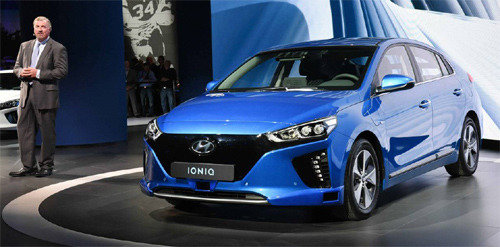Hyundai unveils self-driving IONIQ concept at LA Auto Show
Hyundai unveils self-driving IONIQ concept at LA Auto Show
Posted November. 18, 2016 07:17,
Updated November. 18, 2016 07:24

The newly introduced car, which was built based on the concept of Ioniq electric, the purest form of electric vehicle, has met the conditions for Level 4 automation (required by the U.S. Society’s Automobile Engineers) that certifies the car as fully autonomous. “Hyundai Motor will further make an effort to realize its vision on ‘traveling’,” said Dave Zuchowski, the chief executive officer of Hyundai Motor America.
Driving automation levels are divided into five tiers from 0 to 4. Level 0 means that driver has to control everything. On Level 1, only a small part of the unit functions are controlled by the built-in software. Level 2, which is being gradually adopted by premium sedans including the Genesis EQ900, allows the vehicle to cruise through relatively easy traffic conditions such as on a freeway. Level 3 and Level 4 are each referred to as “Hands off and eyes off” and “Mind off” levels. On Level 3, driver is only required to pay attention in the event of unexpected situations, and on Level 4, driver may fully disengage from the wheel.
Hyundai’s Ioniq electric vehicle has achieved Level 4. For now, the driving routes are limited to certain areas prepared with a full amount of data on the roads and other traffic information. In other words, a full-blown commercialization might take some more time. Hyundai is planning to demonstrate the driving of the autonomous car during the 2017 International Consumer Electrics Show (CES), which will take place in Las Vegas in January next year.
“The vehicle has been developed in order to realize autonomous driving in a way that is as simple as possible,” said Mike O’Brien, vice president of Corporate and Product Planning at Hyundai Motor America. “The autonomous Ioniq electric vehicles are hardly different from the existing Ioniq electric cars in their appearance.” In other words, automation was factored in from the initial stage of designing the Ioniq series.
It is also notable that the technologies applied to other commercialized cars, have been implemented in the new self-driving vehicle. For example, the front radar of the advanced smart cruise control (ASCC) and the camera of the lane keep assist system (LKAS) have been combined with the Light Detection and Ranging (LiDAR) technology. This guarantees the driving experiences to be safe by identifying the exact location of vehicles and detecting the surrounding environment more easily.
The 2016 Los Angeles Auto Show also served as an opportunity to make inroads into the North American market for the Genesis, an independent sedan brand of Hyundai Motor. Notably, the premium sedan brand set up an independent exhibition venue for the exhibition. Established in November last year, the Genesis debuted the G80 model for the first time in America in August, and it has been driving the sales of the G90 (known as EQ900 in Korea) from last month. The Genesis enhanced the G80 line-up, which only had the 3.8 GDi and 5.0 GDi engines, by adding the 3.3 Turbo GDi engine, to introduce the G80 Sports to sharpen the competitive edge in the premium sedan market. The G80 Sports will be officially released in America during the first half of 2017.
Kia Motors, another giant automaker of South Korea, presented the Soul Turbo as its main model for the auto show. The Soul is enjoying huge popularity in North America among many entry-level crossover utility vehicles (CUVs) competing in the market. The Soul Turbo, which will be released in America next month, is expected to boost Kia’s current strong sales performance in the continent.
Chang-deok Kim drake007@donga.com







